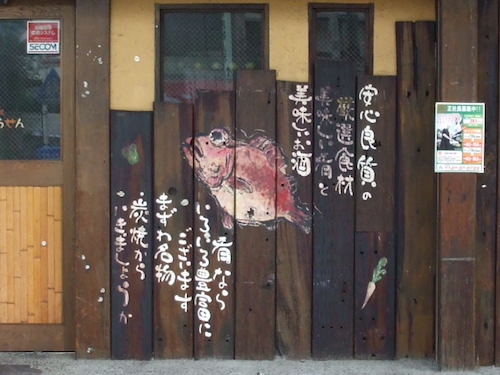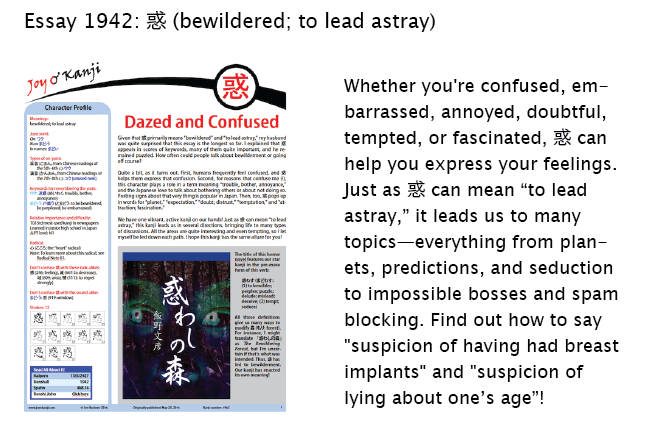Bewildering Pairs
Let's start with a quiz. Find three pairs of words that intuitively go together:
1. bewilderment
2. pillow
3. to sink
4. railroad tie
5. embarrassment
6. melancholy
I'll block the answers with a fun picture of railroad ties reincarnated as a restaurant ad:

Here's what it says, right to left:
安心良質の厳選食材
Safe, high-quality, carefully selected ingredients
安心 (あんしん: safe); 良質 (りょうしつ: high quality); 厳選 (げんせん: careful selection); 食材 (しょくざい: ingredients)
美味しい肴と美味しいお酒
Delicious appetizers and delicious saké
美味しい* (おいしい: delicious); 肴* (さかな: appetizer served with drinks, a non-Joyo kanji); 酒 (さけ: saké)
肴ならいろいろ豊富にございます
An abundance of all kinds of appetizers
豊富 (ぼうふ: abundance)
まずわ名物炭焼からいきましょうか
Why don't you start with our specialty, charbroiled meat or fish?
名物 (めいぶつ: specialty); 炭焼 (すみやき: charcoal-roasted)
The まずわ should be まずは, but it's written wrong to grab people's attention.
Here are the pairs that make sense together, at least to the Japanese:
1 and 5. bewilderment and embarrassment
2 and 4. pillow and railroad tie
3 and 6. to sink and melancholy
I came upon the first pair in the new essay 1942 on 惑 (bewildered; to lead astray) with these nearly synonymous terms:
困惑 (こんわく: (1) bewilderment; perplexity; bafflement; (2) embarrassment)
to be in trouble + perplexed, confused
当惑 (とうわく: (1) bewilderment; perplexity; confusion; (2) embarrassment)
when doing something + bewildered, perplexed
Consider these sample sentences about bewilderment, which come from that essay:
予想外の事態に人々は困惑した。
People were bewildered by the unexpected situation.
予想外 (よそうがい: unexpected); 事態 (じたい: situation); 人々 (ひとびと: people)
彼の機嫌が突然変わって、私は大いに当惑した。
I was completely bewildered by his sudden change of mood.
彼* (かれ: he); 機嫌 (きげん: mood); 突然 (とつぜん: sudden); 変わる (かわる: to change); 私 (わたし: I); 大いに (おおいに: greatly)
Now take a look at these two comments about embarrassment:
彼女は自分が言ってしまったことに困惑した。
She was embarrassed by what she had said.
彼女 (かのじょ: she); 自分 (じぶん: oneself); 言う (いう: to say); -てしまう (indication of regret)
彼のぶしつけな質問に少女は当惑した様子だった。
The girl looked embarrassed at his rude question.
ぶしつけ (不躾: rude, in which 躾 is non-Joyo); 質問 (しつもん: question); 少女 (しょうじょ: girl); 様子 (ようす: look)
To me, bewilderment and embarrassment seem miles apart. My proofreader agrees but notes that if someone exhibits confusion in a public and especially a professional setting (e.g., not knowing an answer one should know), it’s embarrassing. Another proofreader observes that Japanese seems to lack a noun that precisely expresses “embarrassment,” so 困惑 and 当惑 have had to carry that load.
Here again is the second pair, pillow and railroad tie. To be precise, they are the primary definitions of the following kanji:
枕 (2115: pillow; structural bolster)
The second meaning plays a starring role in this term:
枕木 (まくらぎ: railroad tie) bolster + wood
"Bolster" in this sentence is a figurative spinoff on "pillow" because a railroad tie supports the rails just as a pillow supports the head. In the Japanese realm, says my proofreader, bolsters strongly connect to pillows. Yes, that's certainly true in yoga, where we use pillowlike bolsters under various body parts. But I associate pillows with downy softness, which is hardly the image that comes through here:

As for the third pair, to sink and melancholy, I'm referring to this kanji and its primary definitions:
沈 (1601: to sink; melancholy; quiet)
"In our mind 'to sink' is connected to the other two," my proofreader said, arguing that on that basis, I could eliminate "melancholy" and "quiet" as main definitions. Not a chance! To me, a sinking boat is an ocean apart from melancholy music or a husband who answers questions about his day with monosyllabic answers.
All this serves as the umpteenth reminder of how learning Japanese in general, and kanji in particular, requires one to enter the Japanese mind. And it's not enough to find the special landmarks there. One needs to see how they all connect, as if one were drawing an endlessly elaborate map of that mind.
The new essay on bewilderment, embarrassment, and much more should get you part of the way there. Here's a preview:

Have a great weekend!

Comments